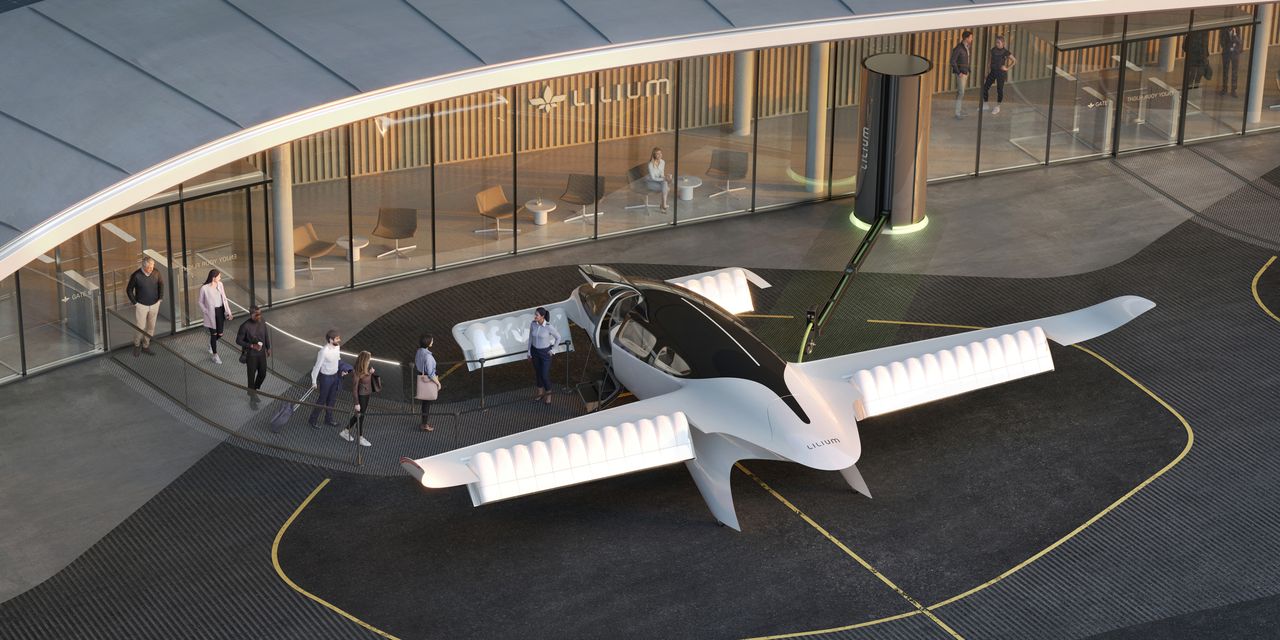Air taxis evoke scenes from “The Jetsons” and “Back to the Future II,” in which workers fly through futuristic cities on their commutes. The reality could end up having more in common with modern-day helicopters and regional planes.
In recent months, the top four startups dedicated to electric vertical-takeoff-and-landing vehicles, or eVTOL, have been taken public by special-purpose acquisition companies. California-based Joby Aviation and Archer were the first to announce deals earlier this year, followed by Germany’s Lilium and, a few weeks ago, Britain’s Vertical Aerospace. All plan to start services around 2024 by both building and operating aircraft, which would be a very unusual business model in the transportation industry.
Becoming the
Boeing
or
Airbus
of air taxis will be hard enough. As analysts at Cowen point out in a new report, the four startups expect to make almost 4,000 vehicles in 2027, which is more than all the commercial jets, business planes and helicopters manufactured in 2018, the peak year. Also, they have a high certification bar to clear.
However, it is the second part of the business plan—taking on Uber and
Lyft
—that really defies precedent.
There are two reasons to hop on a taxi: convenience and speed. But unlike a car, an eVTOL vehicle needs dedicated “vertiports” to land and take off. Air-taxi companies are partnering with firms like parking-garage owner REE and construction contractor Ferrovial to build them, but if restrictions on helicopters are a good guide, many cities won’t be able or willing to host enough vertiports to make for a financially viable air-taxi network.
Moreover, traveling to and from the vertiports would often require other means of transportation, making the effort pointless for most trips under 30 miles, which is Uber’s market. Wall Street bankers wanting to get to JFK airport could perhaps use a well-located vertiport, but for the vast majority of urban commuters an eVTOL trip may never make sense. At any price.
The example of Blade Urban Air Mobility, which allows customers to book trips on helicopters and jets through a smartphone app, points in a different direction. Despite its branding, the company takes rich people on distances of 100 miles or more, such as Manhattan to the Hamptons or Los Angeles to Aspen, Colo.
While less reminiscent of a Robert Zemeckis movie, such regional connections are a more feasible home for eVTOL technology. By operating air taxis, airlines could open up new premium routes between densely populated areas that are five hours away by car. United Airlines and
American Airlines
have already placed pre-orders with Archer and Vertical, respectively.
Lilium is the only eVTOL startup focusing on this market. Its Lilium Jet, powered by 36 small electric motors, is designed to take six passengers on trips of up to 130 miles—and further as batteries improve. The company wants to start operating between cities within Florida and Germany. It also envisions its enterprise customers making package deliveries, which Cowen sees as a $2.5 trillion market in five years’ time.
Similar ideas have failed in the past. But helicopters already attract enough demand to be a $50 billion market even with charter costs per trip above $1,000. The Lilium Jet is four times cheaper to operate and “it will probably end up being six to 10 times cheaper, because the aircraft and battery costs will come down,” said Lilium’s Chief Strategy Officer Alexander Asseily.
Electric propulsion has the potential to revolutionize regional flights. To get to our favorite restaurant, though, we may still need roads.
Write to Jon Sindreu at jon.sindreu@wsj.com
Copyright ©2020 Dow Jones & Company, Inc. All Rights Reserved. 87990cbe856818d5eddac44c7b1cdeb8














































